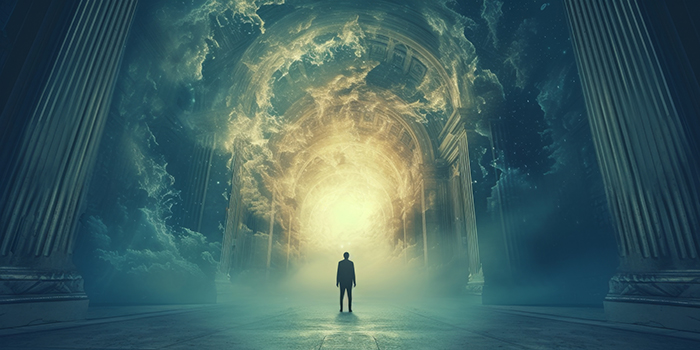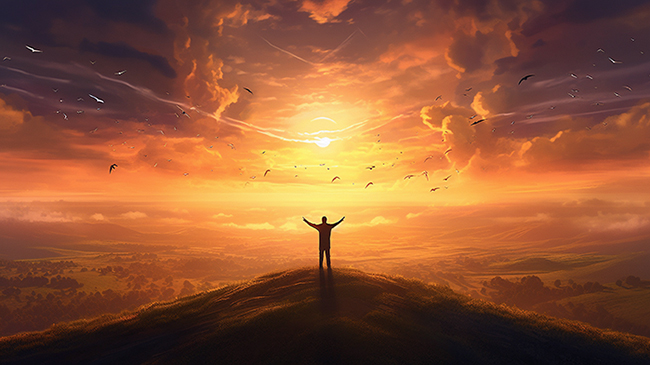June 7, 2024
Welcome to this week’s Bill Harvey Blog

We all pay some attention to our inner lives. But for some of us this means sustained micro-observation and for most of us it is occasional flashes in between slavish addiction to the endless rushes of information coming in through our five fascinating physical senses.
This tsunami of infobits roaring in has itself escalated over time, causing even more outward focus.
But even 2500 years ago, Aristotle made the same observation, commenting that the unobserved life is not worth living. He was trying to get more people to turn inward. His teacher’s teacher Socrates had started the whole thing by his exhortation “Know Thyself”. (Socrates had inspired Plato with whom Aristotle studied.)
The greatest philosophers and psychologists of all time were all practiced at inner micro-observation. This was especially true in ancient India, and for example, metacognition is at the core of Buddha’s teachings. In the modern era this includes William James, perhaps the best of them all at concentrated introspection, as well as Carl Jung, Sigmund Freud, and Abraham Maslow. Freud however was more of a rationalist, deducing things logically, whereas Jung was more of an intuitionist, taking the original feelings arising in his cognition without embellishing them with rational overlays as much as Freud did.
A long time ago by introspection I realized that thoughts do not arise as thoughts but as feelings, and then the cognitive affective processes embellish those feelings with attributed meanings, interpretations, often involving images, metaphors, and words, at which point they are truly what we all call thoughts.
This has recently been discovered by science, decades and millennia after the same insight was available to each of us by micro-inner-observation.
It will help you attain metacognition to imagine that your inner space has a map. At the pure core of your being imagine that you have a center, something like an energy or a gas, that you can sense. In higher states of consciousness such as the spiritual level of Flow state you can see this self of yours as light, often bluish. Most of the time you can only feel it.
Imagine now in this map that there is another part of yourself that you yourself have built over time, a superstructure that is overlaid on top of the central sphere of your selfness. Suspend disbelief for the sake of argument, and for the moment consider my theory that this part of you is akin to an artificial intelligence (AI) that has a physical underpinning of neurons and their interconnections in your brain and nervous system, specific neurons and interconnections which were caused by your experiences, especially where there were degrees of emotion and assimilated “learning”. The word “learning” is in quotes because much of this was mis-learning.
The entire superstructure taken together corresponds to what Freud termed the Ego.
This superstructure uses a substantial part of your mental energy but the return on that energy investment tends to be negative. The expenditure of this incremental cognitive load tends to do you a lot more harm than good.
Freud said that this appurtenance was called into being when the baby first experiences frustration at not getting what it wants or needs. It functions as the security officer (Worf in Star Trek) and press agent, business manager, negotiation agent, sales rep for what Freud called the Id, and I refer to above as your core beingness.
The reason I say Freud was more of a rationalist is that when I introspect into my Id or core essence self I do not find the animal selfishness and limitation to hardwired instinct that Freud said I would find there. Instead I find a happy lightness of being that is not needy but is caring and fascinated.
Try this experiment and I feel that you will totally get what I’m saying and can add it to your personal strength arsenal.
- Take your place in your core, the pure witness, the observer.
- From that vantage point, simply observe the feelings that arise in your superstructure.
- You will sense the apparent duality in you at that point, probably a realization of your own indifference and yet interest in these ego feelings.
- This higher feeling is the most important key to metacognition.
You may have experienced this many times in your life, and it may have come about by temporarily hitting bottom. When you have been pushed around by life and have not seen the lesson the universe intended, you may in your frustration, resentment and rage just say to yourself that you give up, you just don’t care anymore.
When this happened to Bucky Fuller – heartbroken by unrequited love – he decided to commit suicide. Once he did that he was in his core self, looking at all of the superstructural self he had built, disillusioned in a good way by all that stuff, having just given it all up. He now discovered no reason to end his life, for a new better version of it was just beginning. He then became the Bucky Fuller genius we all remember.
You can practice this core self-perspective any time you want, for a few seconds or minutes or extended periods, even continuously for the rest of your life.
The essence of the feeling is that you are above all the nigglings in your superstructure. It’s only habit which has made you so vulnerable to those sudden feelings of worthlessness, fear, anxiety, defeatism, hatred, envy, resentment, and so on which have become automatic and super powerful.
Habits reinforced by hundreds of thousands of repetitions in your life do not pack up and go away right away. They will sometimes come back and even overpower you sometimes. But once you have learned to identify with your core and not your superstructure you are on the high road to true freedom. Keep practicing this Observer state and you cannot lose.
My best to all,
![]()


 These are the times that test what we’ve got. Each of us…
These are the times that test what we’ve got. Each of us…